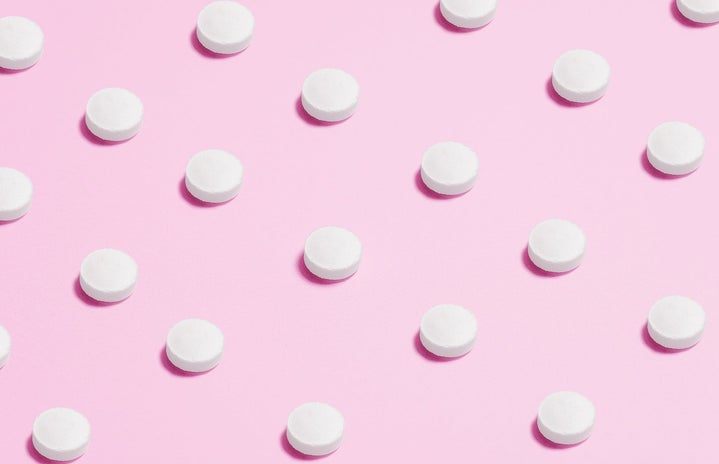A 2018 study done by Ohio State University showcased that 9.1% of students reported misusing pain medications, 9.4% reported misusing sedatives and 15.9% reported misusing stimulants. A large portion of students reported using drugs for academic advantage, while a small portion of those students truly understand the consequences of the drug they are ingesting.
Miss America 2020 and current Virginia Commonwealth University pharmacy student, Camille Schrier, has advice for students on how to keep medication safe on campus. Camille is an advocate for medication safety on campus through her social initiative, Mind Your Meds™. In this Q&A session, Camille touches on drug misuse on college campuses, her social initiative, pharmacy school, peer pressure, drug sharing and more.
What sparked your interest in becoming a pharmacist?
My interest in becoming a pharmacist started with my mom. She worked as a nurse; so, growing up, I was extremely aware of medications and their risks. As a child, I was frequently sick with colds, strep and the flu, so I was familiar with over-the-counter and prescription medications and had many interactions with the healthcare system. Watching my mom be extremely diligent regarding the medication I was taking was something that was normal for me growing up. Now as a third-year pharmacy student, I realize how lucky I was to have a parent with that much knowledge about medication safety.
As I went through school, I was always interested in science but wasn’t sure what STEM career path I would ultimately take. I never imagined myself in healthcare because I didn’t see myself in a direct patient care role such as a traditional doctor or nurse. Although I loved the concept of medicine, I never even considered pharmacy as a potential career path until college. When I was in my biochemistry courses at Virginia Tech, I began to learn the science behind some of the substances that we have created that can cure diseases or completely change a person’s quality of life. Ultimately pharmacy came onto my radar during an internship with a pharmaceutical company, where I learned that a pharmacist could do far more than dispense prescriptions. The concept of being an expert on medications that could change people’s lives was the perfect fit for my skills and passions.
How has your role as Miss America played into your education as a pharmacy student and future pharmacist?
I don’t think people traditionally imagine that doing a job like Miss America would be an invaluable asset for success in a science-based career, but for me it absolutely was. Each candidate within the Miss America program has the opportunity to advocate for a social issue of her choosing during her role. I chose medication safety and abuse prevention as my primary cause, while also advocating for the importance of STEM where I was able to interact with kids and perform science demonstrations.
As a student, serving as Miss America gave me a much greater perspective on the world as a whole that I hadn’t seen from sitting in lecture halls. I met people from different backgrounds than mine, people from different economic situations, and learned about issues that exist in communities far different from my own.
During my role as Miss America, I took two years away from school, but the things I learned allowed me to return as a more motivated student with a far greater perspective, while also providing me clarity on my future career path. While being a student can be exhausting, I am now even more grateful to have the privilege to be a woman dedicating my full time to studying science.
Can you explain to me what your social initiative is, and what it advocates for?
My social initiative is Mind Your Meds™ which highlights the importance of being aware of the medications that you’re taking and the risks that these substances could pose to you or your family. It’s critical to empower patients with knowledge about the medications they take to provide them with the ability to make choices to keep them and their families safer.
How did you decide this was to be your social initiative? Essentially, why is medication and drug misuse so important to you?
When choosing the cause I wanted to advocate for, I wanted it to meet a couple of qualifications. I wanted it to be something I was already doing and passionate about. I also wanted the issue to be relevant to any person that I met as Miss Virginia or Miss America. During my first year of pharmacy school, we learned how to counsel patients picking up prescriptions, including reviewing side effects, risks and how to properly take the medications. We learned how to teach parents to properly measure liquid medications for kids and how to avoid medication errors. I quickly realized how confusing these tasks can be for parents, and how this can lead to unintentional medication errors. I also learned how to administer naloxone and began to understand the gravity of the opioid epidemic, which began my passion for combatting opioid use disorders and reducing overdoses.
I’ve seen peers outside of pharmacy school mismanage both over-the-counter and prescription medications and have even seen drugs misused on campus. One of the most common practices I observed was students using stimulants improperly, not locking them up, sharing medication and not being aware of potential risks. We are so lucky to have access to medications but understanding how to prevent harm is crucial. These are a few of the reasons why I chose Mind Your Meds™ as my social initiative.
Can you share with me why drug misuse is so prevalent among college students?
From my own experience in college, the number one drug misused was stimulants. When I saw misuse, it was often for some type of academic advantage like studying for an exam, having the ability to hyper-focus or staying up all night studying.
I think that seeing young adults using a substance to try and get through an academic experience speaks to the kind of pressure on students and the current college environment. From the quantity and speed of information delivered to the large number of tests and projects, combined with managing a social life and pressure for leadership and extracurricular activities… my time in higher education has been some of the most stressful times of my life.
One of the major issues we see with college students is drug sharing. Can you explain what drug sharing is? And why is it so common among college students?
Giving a prescribed medication to another person or taking a prescription medication intended for someone else would constitute drug sharing. Medications are prescribed for a variety of reasons, including their risks for harm and/or misuse. Several considerations go into a doctor’s decision to prescribe a specific drug and dose, including a patient’s allergies, medical history or even body weight and genetics. Sharing prescription medications is a dangerous practice that can result in serious or even life-threatening consequences. Unfortunately, drug sharing is a commonplace practice even outside of college campuses.
For sharing to occur there must be two parties involved, the person prescribed the medication and the person taking it from them. If both of these individuals participate knowingly and willingly, both are in the wrong. The person who holds the prescription has a responsibility to protect that medication to prevent diversion, misuse, or even accidental overdose. No matter the drug – sharing medications is a major safety issue. The only way we can effectively tackle this practice is if we can change the culture around medications, and help individuals understand the real consequences that could result from this dangerous behavior.
How can I avoid peer pressure and the consequences of losing friends if I don’t want to use drugs?
It is unfortunate that people feel peer pressure to make such dangerous decisions. As a college student, I would try to avoid the situation completely by staying away from events or locations where I knew drug use would be happening. If you’re in a place where there’s something happening that you’re not comfortable with, find an excuse to remove yourself from the situation – like asking a friend or roommate to pick you up. Lastly, I would encourage you to stand up for what you believe in and talk to your friends about your values. You are ultimately the only one responsible for your own decisions and actions.
As a student yourself, but also a former undergraduate student, how can we be proactive in advocating and sharing information with our peers as students?
Open discussion. If you see situations or behaviors that you know are unhealthy or risky, especially if it’s someone you are close with, have an honest and caring conversation. Don’t approach them as if you’re judging them or berating them but say something like “Hey, I don’t want you to get hurt” or “I want you to be around.”
Also, it’s so important for students to be responsible stewards of their medications by locking them up and keeping them in a safe place. A great option for this is the Safe Rx locking pill bottle that allows someone to secure medications with a tamper-proof bottle and a 4-digit code of their choice.
I also use my social media channels to bring awareness to the fact that this is still an issue and help people to understand the repercussions and risks. I also encourage people to have safe and healthy behaviors and to surround themselves with friends and fun activities that don’t involve these types of things. If people are confused or unsure, they can always talk to their healthcare providers and pharmacists.
If you see situations or behaviors that you know are unhealthy or risky, especially if it’s someone you are close with, have an honest and caring conversation.
If my friend or family member, or even myself wanted help with drug misuse, what resources are already in place for me to acquire help?
Many campuses have resources available. For example, the University Student Health Services department at VCU provides resources and counseling on addiction and recovery.
Also, lock up your medication in a locking pill bottle to keep it safe. I serve as an advisory board member for Safe Rx and believe safe storage of medication can go a long way in keeping medicine from falling into the wrong hands.
Do you have any advice for students wanting to become pharmacists or students interested in advocating for substance use disorders?
For students who want to become pharmacists, pay attention in your undergrad chemistry classes and be strong in math. Pharmacy school is one of the most difficult things I’ve ever done academically, but I’ve also learned so much.
Remember, as you go through really difficult situations it helps lead you to the next level. It’s like any professional school where you have to work really hard to be successful, and you’re going to have to work harder than you ever have before until eventually, you’re like “OK, I’ve done it”!
For people who are interested in advocating for substance use disorders, there are a lot of recovery programs and so many options for involvement. You can become trained in naloxone administration, which is a great first step for people to support those who are going through substance use disorders – and especially opioid use disorders. Being able to support your friends and family through kind open conversations and utilizing non-judgmental language.
There are many things we can do in our daily lives to advocate for those with substance use disorders. We need more advocates for the issue because people with substance use disorders are often forgotten about, judged, and stigmatized because of the issues they have gone through. So, if anyone can help to change that narrative, it can be really productive.
This interview is for informational purposes and the views only represent the individual. It does not constitute providing medical advice or professional services.


